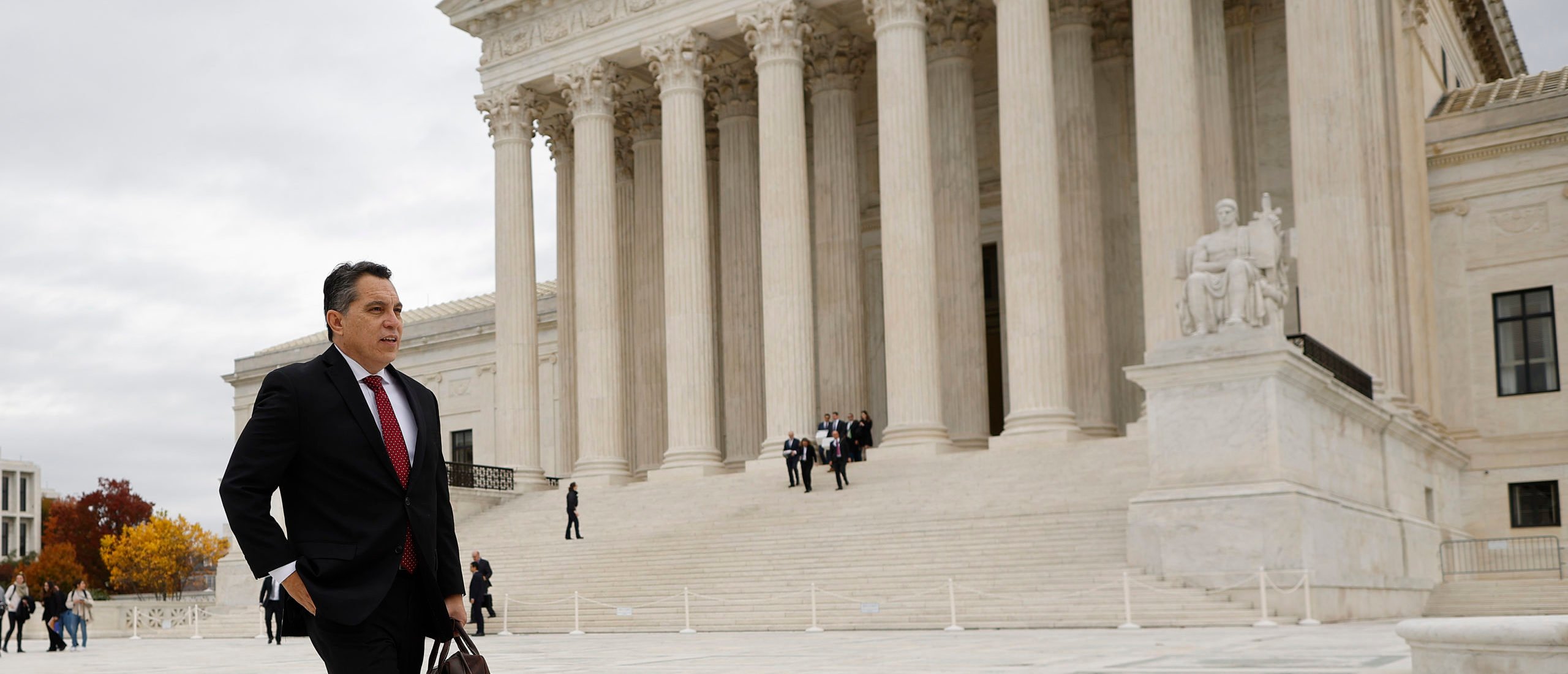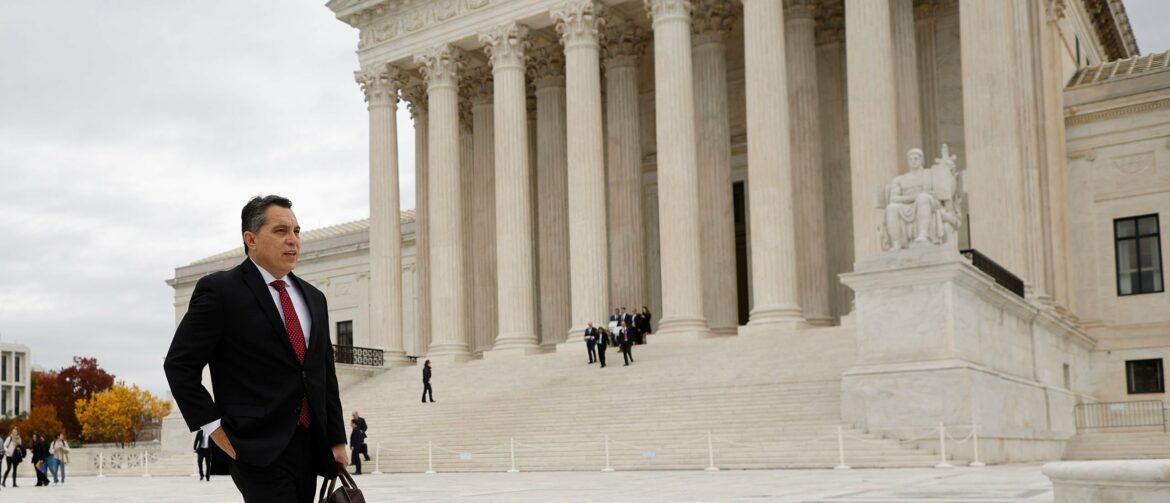
The Supreme Court Term Begins This Week. Here Are The Cases You Need To Watch.
Katelynn Richardson on October 1, 2023
- The Supreme Court begins its term this week with oral arguments for cases challenging the constitutionality of the Consumer Financial Protection Bureau’s (CFPB) funding mechanism and considering whether an Americans with Disabilities Act “tester” can sue hotels she never visited for failing to offer accommodations.
- The coming term will include major cases on the First Amendment, gun rights and the administrative state.
- The justices have agreed to hear 34 cases so far this term, with more to be granted in the coming weeks and months.
A new Supreme Court term that will include major cases on the First Amendment, gun rights and the administrative state is set to begin this week.
The justices have agreed to hear 34 cases so far this term, with more grants to come. Oral arguments kick off on Monday, with arguments scheduled on Tuesday for a case challenging the constitutionality of the Consumer Financial Protection Bureau’s (CFPB) funding mechanism and Wednesday for another case considering whether an Americans with Disabilities Act “tester” can sue hotels she never visited for failing to offer accommodations.
Here are some of the biggest cases to watch as the term begins.
First Amendment
The term includes multiple major First Amendment cases with significant implications for free speech online. (RELATED: Supreme Court To Hear Cases Challenging Red State Anti-Censorship Laws)
The Supreme Court agreed Friday to hear a pair of challenges to Florida and Texas laws against viewpoint censorship online. NetChoice, a trade association of tech companies, argues the laws violate social media platforms’ First Amendment rights by restricting their ability to moderate content. The Biden administration urged the Supreme Court in an August brief to overturn the laws.
The justices will hear another pair of cases on Oct. 31 regarding government officials who blocked constituents online, Lindke v. Freed and Garnier v. O’Connor-Ratcliff. Garnier deals with two California school board members who blocked parents for critical comments on Facebook and Twitter, and the other with a Port Huron, Michigan, city manager who blocked a constituent that posted critical comments about his COVID-19 pandemic response.
At the heart of the cases is the question of whether the officials’ decisions should be considered state action, and therefore First Amendment violations, even when done through their personal social media accounts.
Administrative State
On Tuesday, the Supreme Court will hear the first of its big cases on the administrative state: CFPB v. Community Financial Services Association of America.
The plaintiffs in this case, who initially brought their lawsuit over the CFPB’s Payday Lending Rule, are challenging the constitutionality of the regulator’s funding mechanism. Rather than receiving funding through Congress’ annual appropriations process, the CFPB received its funding from the Federal Reserve.
“We agree that, for the most part, the Plaintiffs’ claims miss their mark,” Judge Cory T. Wilson wrote in the 5th Circuit opinion. “But one arrow has found its target: Congress’s decision to abdicate its appropriations power under the Constitution, i.e., to cede its power of the purse to the Bureau, violates the Constitution’s structural separation of powers.”
Another case that could have significant implications for the administrative state is Loper Bright Enterprises v. Raimondo. It gives the Supreme Court a clear shot to overturn “Chevron deference,” a legal doctrine rooted in 1984 precedent, which holds that courts should defer to executive agency interpretations of statutes where the language is ambiguous.
Another case, Securities and Exchange Commission v. Jarkesy, could upend the SEC’s internal adjudication processes, which the plaintiffs challenged as unconstitutional.
The Fifth Circuit previously agreed with the plaintiffs that the SEC’s in-house adjudication process using administrative law judges (AJLs) was unconstitutional, finding that it deprived them of a constitutional right to a jury trial, was based on Congress’ unconstitutional delegation of legislative power to the SEC and that removal restrictions on AJLs violated the Constitution by leaving them insufficiently accountable to the President.

WASHINGTON, DC – OCTOBER 31: Attorney David Hinojosa (R) leaves the U.S. Supreme Court after oral arguments on October 31, 2022 in Washington, DC. (Photo by Chip Somodevilla/Getty Images)
Gun Rights & Taxes
Just two years after its last major Second Amendment case, the Supreme Court agreed to take another, United States v. Rahimi. The individual at the center of the case, Zackey Rahimi, has mounted a constitutional challenge to a statute barring subjects of domestic violence restraining owners from possessing firearms.
Rahimi is “hardly a model citizen,” as the Fifth Circuit noted in its decision to side with him. He was involved in five shootings between December 2020 and January 2021, including one where he fired shots in the air after his friend’s credit card was declined at a Whataburger.
But as the Fifth Circuit found and gun rights groups agree, the question is one of due process. The restraining order used to strip Rahimi of his Second Amendment rights was obtained through the civil law process, not the criminal law process.
“An unconstitutional, broad statute like this prohibited person category can result in the good guys getting disarmed while bad guys run free,” Aidan Johnston, director of Federal Affairs for Gun Owners of America, told the DCNF in August.
Also slated for this term is a major tax case, Charles G. Moore et ux. v. United States, which could throw cold water on Democrats’ hopes for a wealth tax. The case considers whether income can be taxed before it is received.
“A century of precedent shows that – in order to be taxed – income requires realization: this means that income taxes can only be levied on realized income,” Dan Greenberg, general counsel at the Competitive Enterprise Institute, previously said in a statement provided to the DCNF.
Cases That Could Be Accepted Soon
There’s a number of petitions pending before the Supreme Court that could be granted in the coming weeks and months.
Among them is Vitagliano v. County of Westchester, a prospective sidewalk counselor’s challenge to a law Westchester County, New York, passed in the aftermath of the Supreme Court’s decision to overturn Roe v. Wade that created a 100-foot “buffer zone” outside abortion clinics. Within this zone, it is illegal to approach another person to engage in “oral protest, education, or counseling” without their consent.
The justices could also hear a case about bias response teams at hundreds of universities nationwide and whether such entities chill student’s speech.
The highly publicized abortion pills case seeking to overturn the FDA’s approval of mifepristone, the first of two drugs used in a chemical abortion, could also be heard this term. After the Fifth Circuit upheld some restrictions on the pill, such as sending them through mail order, the Biden administration appealed to the Supreme Court in September.
All content created by the Daily Caller News Foundation, an independent and nonpartisan newswire service, is available without charge to any legitimate news publisher that can provide a large audience. All republished articles must include our logo, our reporter’s byline and their DCNF affiliation. For any questions about our guidelines or partnering with us, please contact [email protected].
